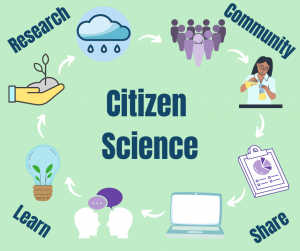 If a lay person with no medical credentials were to try to heal somebody of a serious illness, they would be considered a charlatan and prosecuted. The word “amateur” has a negative connotation in most languages. On the other hand, genealogy research or Wikipedia would not thrive without the participation of enthusiastic non-specialists. How does citizen science line up? How does the term “citizen scientist” distinguish participants in projects and separate them from imposters?
If a lay person with no medical credentials were to try to heal somebody of a serious illness, they would be considered a charlatan and prosecuted. The word “amateur” has a negative connotation in most languages. On the other hand, genealogy research or Wikipedia would not thrive without the participation of enthusiastic non-specialists. How does citizen science line up? How does the term “citizen scientist” distinguish participants in projects and separate them from imposters?
Often labelled as participatory research, lay contribution to science and scholarship has been around for a while, with a strong emphasis on participation. The participatory approach to learning, design, decision making, communication, methods, and more has become part of the general movement promoting ideas and actions for inclusive development and social change. Citizen science is often described as “public participation in scientific research.”
Spanning science, social science, and the humanities, there are countless organizations providing various exciting projects to get involved and participate in research in diverse disciplines, many recorded in our new Citizen Science research guide. Coming in all shapes and forms, most projects can be listed under one of two major categories: projects recruiting volunteers to collect data for analysis by institutionalized scientific research and projects focusing on large quantities of data to manage, transcribe, or interpret.
The common denominator seems to combine the two basic guiding principles of citizen science: that science should be responsive to citizens’ concerns and needs and that citizens themselves could produce reliable scientific knowledge (see source and more in the entry in Wikipedia). As a result, most projects focus on staying connected to the public while promoting decision-making on sound scientific principles.
How do volunteer citizen scientists feel about the work they do? For some, it can be a lot of fun; for example, when one of biology’s hardest problems becomes just a game for ordinary people. Others recommend that people trying to keep themselves safe and sane during the pandemic try “citizen Science-ing where you are.” There is no shortage of opportunities to get involved in a working group via respectable organizations, such as the Citizen Science Association. Our Citizen Science research guide also offers a variety of choices to join projects in New Jersey, such as the New Jersey Forest Service or the Invasive Strike Force, many of them run by current or retired Rutgers professors.
Those interested in scholarly publications can also check out our curated list of books, scholarly articles, and other related sources in the research guide under Library Resources. As often happens, sometimes journals dedicate an entire special issue to the topic, such as the 2017 supplement of Biological Conservation, discussing citizen science from multiple perspectives.
The question remains: is citizen science data collection worth the effort? There’s no doubt that citizen scientists, with their sheer volume, provide invaluable support to science by helping to examine and analyze what would otherwise be unmanageable amounts of information. How about the quality of their contribution? A 2016 comparison of marine debris data collected by researchers and citizen scientists claims that citizen scientists were at least as efficient as researchers, and the data they collected are robust and reliable, given the appropriate training. An interesting tidbit from the same study is that primary school student participants found more litter on beaches than did older students!
Gaps and redundancies are inevitable in many of these projects. As noted in a recent PLOS article, “citizen scientists collect data with distinct spatial and temporal biases, leading to unfortunate gaps and redundancies, which create statistical and informational problems for downstream analyses.” The solution lies in each project itself, but frameworks have been suggested that can be adapted to citizen science projects. All in all, research methodology is definitely the key, also proven by a QuickSearch that returned over 1,000 scholarly articles.
For scientists, the benefits of investing in citizen science via outreach to the community definitely include a very pragmatic one, other than the outreach itself: the work will get done, even if the task seems insurmountable. For the individual, especially for students at the beginning of their career, participation may serve as a great networking opportunity in a non-threatening, casual work environment, where they can explore a potential career path. The experience comes with rewarding outcomes for them, such as learning about new areas and new skills on the fly (soft and hard), and getting their feet wet with science communication. There is also that good feeling one has when volunteering: doing something for the greater good.
Citizen science projects have the potential to reinforce crucial basic values and practices, such as collaboration and respect, diversity and inclusion, and transparency and integrity, indicating the importance of these projects beyond science. Additionally, during this pandemic as people are trying to maintain some relevance to their lives, participating in an online citizen science initiative will support self-preservation while social distancing. Finally, let’s admit, outstanding scholarship is largely about passion. The best scientists always followed their interest in a subject matter for various, often undisclosed or subconscious reasons, for the benefit of mankind. Citizen science is there for everyone to match their passion.